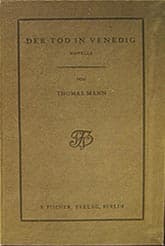Death in Venice
Critique • Quotes • Translations • At the movies
 First edition
First editionOriginal title
Der Tod in Venedig
First publication
1912
Literature form
Novella
Genres
Literary
Writing language
German
Author's country
Germany
Length
Approx. 20,000 words
Desire in fact
The argument over Death in Venice is usually about whether the theme is homosexual desire. Which is too bad really.
When I first read Thomas Mann's short novel as a young man myself, I was adamant in defending it against the interpretation that it was about repressed sexual yearning.
Yes, sexuality—or sensuality, rather—plays a role, but the story is really about a platonic ideal, I argued then. It concerns the ideal of perfection sought by the writer Gustav Aschenbach in his work but always just beyond his grasp, as represented by the beautiful boy, Tadzio, with whom he has no physical contact. On the beach at Venice, Tadzio becomes aware he was being watched by the older man and once—possibly more often (we don't know how much to trust the perceptions of Aschenbach the narrator)—he acknowledges it. He entices his admirer with a familiar smile, much as perfect Truth and Beauty have always tantalized Aschenbach.
So I argued then.
But now, after a re-read, this seems pathetically naive. Look at the description of Aschenbach's reaction to that smile. He finds himself a dark corner in which to hide and hyperventilate over the gift he has been given:
Strangely indignant and tender admonitions wrung themselves out of him: "You dare not smile like that! Listen, no one dare smile like that to another!" He threw himself down on a bench; in a frenzy he breathed the night smell of the vegetation. And leaning back, his arms loose, overwhelmed, with frequent chills running through him, he whispered the fixed formula of desire—impossible in this case, absurd, abject, ridiculous, and yet holy, even in this case venerable: "I love you!"
No way this is an artist contemplating his philosophical ideals.
It's love or infatuation with somebody for whom one fears one should not have such feelings.
But more than that. It's shock that the object of one's emotions should be so brazen about it. It's supposed to be a publicly suppressed, secretly savoured, highly personal experience. Aschenbach is comfortable with keeping a discreet distance, with intellectualizing the attachment within his private thoughts. But the boy makes it clear his beauty exists not as an ideal, as an abstraction, but as a flesh-and-blood fact. He cuts through (or at least Aschenbach senses he cut through) the middle-aged man's intellectual defences and, in effect, says narcissistically, "Here I am. Aren't I beautiful? Don't you want me?"
It is this reality check that brings Aschenbach down. The brute, unfair, undemocratic, sensual existence of beauty. And of desire.
The artist's self-delusion
It's too bad the issue of homosexuality keeps arising in discussing this novella, as well as the movies based on it. The gender of the love object makes the infatuation all the more illicit, but it is not essential to the story. Rather it's Mann's choice because that is how he as an individual can envision the story, for whatever personal reasons may be locked in his own head.
Take heed of Mann's own admonition in the story: "It is most certainly a good thing that the world knows only the beautiful opus but not its origins, not the conditions of its creation...."
This may in fact be the novella's theme—the carnal source of intellectual creation and the destructive consequences of the artist fooling himself about this. I wonder if Mann's use of long, complex sentences replete with multiple abstract terms to present Aschenbach's musings is intended to emphasize the artist's self-delusion on this score.
But if Tadzio were a coquettish young girl instead of boy, I believe the story could have proceeded almost identically. Almost exactly the same themes and emotions could have been dealt with.
What would have been missed in that case would be the added air of taboo that surrounds Death in Venice. The story would have been slightly less intriguing for a readership of a certain era. But some years from now, when the sexual identity of the love object may no longer be an issue (although the age of the love object may still be), the themes of intellect and sensuality can be discussed without taint and we can see more clearly whether this is an enduring great work of art.
— Eric
Critique • Quotes • Translations • At the movies

